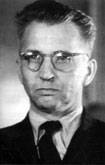
Born: 12 November, 1898, Bratucice or Okulice, Austro-Hungarian partition of Polish-Lithuanian Commonwealth (presently Poland)
Died: 24 December, 1946 in Soviet prison, probably murdered
Early days. His father, Blazej Okulicki, was a farmer. Mother- Anna nee Korcyl. After finishing the elementary school in Okulice he went to a “gimnazjum” (high school) in Bochnia. It was planned that he’ll become a priest. However the outbreak of WWI changed these plans. In 1913 he joined “Związek Strzelecki”, and in 1915 he joined „Legiony”(The Legions). He took part in the battles of Rarancza and Kostiukhnovka. In 1916 he was promoted to sergeant.
Military career. In 1917 he was drafted to Austrian army from which he deserted in 1918, went to Krakow and joined Polska Organizacja Wojskowa (Polish Military Organization). In November 1918, after being promoted to the rank of Officer Cadet he took part in the fight against the Ukrainians in the Lwow region. Later he took part in the war against the Bolsheviks at Wolkowysk, Lida and others. In 1922 he married Wladyslawa Jablonska. Their only son, Zbigniew, died in 1944 in the battle at Osiro, Italy. In 1925 he finished the studies at “Wyzsza Szkola Wojenna” (The Military Academy) and subsequently he taught at the Center of Infantry Training. In 1939 he was appointed second in command of III Department of the General Staff. He participated in the defense of Warsaw. After the destruction of Polish State by the Nazis and the Soviets he organized, under the command of General Karaszewicz-Tokarzewski, Sluzba Zwyciestwu Polski (Service to the Victory of Poland). Later he became the commander of Lodz region of ZWZ (underground Union of Armed Struggle). In October 1940 he was ordered to move from Warsaw (occupied by the Nazis) to Lwow (occupied by the Soviets) where, as Jan Mrowka, he became the commander of the local branch of ZWZ . Arrested by the NKVD in January of 1941, he was imprisoned and tortured in various Soviet prisons and interrogated personally by NKVD’s chief Ivan Serov. Released after the Sikorski-Mayski Agreement of 1941, he joined the Polish Army (under General Anders) re-created in the USSR, where he assumed the post of the chief of staff. After a brief period as the commanding officer of the Polish 7th Infantry Division he was moved to London for training in the “Cichociemni” training camp and then transported to occupied Poland. In July of 1944, during the Operation Tempest, he became the commander of the 2nd Echelon of the Home Army. General Bór-Komorowski, predicting his own arrest by the Soviets after the Warsaw Uprising named him his deputy and successor. Okulicki fought in the Uprising, among other posts as the chief of staff of the Home Army. After the capitulation of the Uprising he managed to evade being captured by the Germans and moved to Cracow, from where he started to reorganize the Home Army. On October 3, 1944 he became the commander of the entire organization. After the Soviet take-over of Poland, on January 19, 1945, he ordered the disbandment of the Home Army, fearing that future existence of an allied force in Poland would only lead to more people being murdered or arrested by the Soviets. Following a NKVD provocation he was arrested in Pruszkow, Poland and abducted to Moscow. Sentenced to 10 years in a staged Trial of the Sixteen, he was murdered on December 24, 1946 in Butyrka prison.
Sources:
Wikipedia (in Polish)
Spartacus
"Polska Podziemna" Postacie (Radoslaw Butrynski)- in Polish
Return to home page:
Prominent Poles